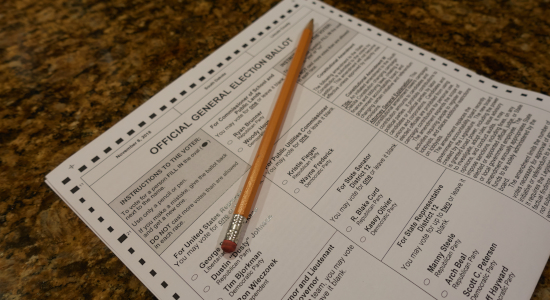
Sept. 15, 2020 – The Wisconsin Supreme Court (4-3) has resolved a case that temporarily blocked the mailing of absentee ballots, ruling that two Green Party candidates did not meet the requirements to be named on the Nov. 3 election ballot.
Last week the supreme court issued an order to halt the mailing of additional absentee ballots to take up the case filed by Howie Hawkins and Angela Walker, members of the Green Party attempting to run for U.S. President and U.S. Vice President, respectively.
The Wisconsin Election Commission, on August 20, ruled that Walker did not meet a ballot access requirement of 2,000 certified signatures because she listed inconsistent South Carolina addresses on nomination papers submitted to the commission.
That is, according to a court brief from the Wisconsin Election Commission – submitted by attorneys for the Wisconsin Department of Justice – Walker submitted 3,880 signatures “[b]ut over 2,000 of those signatures appeared on nomination papers listing an address that was different from Walker’s Declaration of Candidacy.”
The Wisconsin Election Commission ruled that it could not certify the more than 2,000 signatures required after a 6-0 vote that 57 signatures could not be certified and 3-3 deadlock vote on whether 1,834 signatures should be certified.
Members of the six-person Wisconsin Election Commission are appointed by political party leaders in the legislature. Three are Democrats and three are Republicans.
The 3-3 vote was a party-line vote in accordance with the commissioner’s party affiliation, the Democratic-appointed members voting to sustain the challenge to the signatures and declaring them invalid in counting the total number of signatures.
 Joe Forward, Saint Louis Univ. School of Law 2010, is a legal writer for the State Bar of Wisconsin, Madison. He can be reached by
email or by phone at (608) 250-6161.
Joe Forward, Saint Louis Univ. School of Law 2010, is a legal writer for the State Bar of Wisconsin, Madison. He can be reached by
email or by phone at (608) 250-6161.
Wis. Stat. section
8.20(2)(a) requires independent candidates to list their correct address on nomination papers and Wis. Stat. section
8.30(1)(a) allows the commission to deny a request for ballot access if nomination papers do not meet the requirements.
The commission ultimately ruled that neither Hawkins nor Walker could appear on the Nov. 3 ballot. Hawkins and Walker challenged that decision, filing an original action on Sept. 3, two weeks after the Wisconsin Election Commission had reached its decision.
By then, municipal clerks had already sent hundreds, possibly thousands of absentee ballots to voters who requested them, according to the court’s most recent order.
The supreme court’s Sept. 10 order halted the mailing of additional absentee ballots pending a final resolution by the court.
Yesterday, in
Hawkins v. Wisconsin Election Commission, the supreme court ruled that “it is too late to grant petitioners any form of relief that would be feasible and that would not cause confusion and undue damage to both the Wisconsin electors who want to vote and the other candidates in all of the various races on the general election ballot.”
The majority denied the petition to commence an original action, noting that county clerks must deliver ballots to municipal clerks 48 days before the general election, which is Sept. 16, and municipal clerks must deliver absentee ballots to voters by Sept. 17.
The majority noted that more that unofficially, more than 80 percent of voters participated by mail in the August primary election and election officials are preparing for a similar percentage of absentee voters for the general election amidst COVID-19.
“Ordering new ballots to be printed would be an expensive and time consuming process that would not allow counties and municipalities to meet the statutory deadlines for delivering and sending ballots,” the majority of the court noted.
“In addition, for this court to order the printing and mailing of replacement ballots containing the petitioners’ names would create a substantial possibility of confusion among voters who had already received, and possibly returned, the original ballots.”
Three Dissenters
Chief Justice Patience Roggensack, Justice Annette Ziegler, and Justice Rebecca Bradley all wrote separate dissents.
Chief Justice Roggensack argued that “the people of Wisconsin have the right to know the acts of the Commission that took the right of ballot access” away from the Green Party candidates and “suppressed the people's right to choose to vote for Green Party candidates who have maintained positions that are important to them.”
She said the initial complaint was filed by a private citizen, Allen Arntsen, who had no personal knowledge of where Walker lived on what dates.
“[T]herefore his allegation is insufficient to overturn the presumption that the addresses listed on the nomination papers are correct,” the chief justice wrote.
The chief justice noted that the commission deadlocked 3-3 with respect to 1,834 signatures, arguing Arntsen’s complaint was not sustained on those signatures.
“Therefore, Arntsen failed to meet his burden to prove any insufficiency of the addresses for Walker listed on the nomination papers,” the chief justice wrote.
Justice Ziegler said the candidates were “illegally omitted” from the ballot and the majority abdicated its “duty to right this wrong before the election.” This abdication of responsibility, she wrote, “undermines ballot access and voter choice.”
Justice R. Bradley, in her dissent, said “Wisconsin law unquestionably requires that Mr. Hawkins and Ms. Walker appear on the ballot.”
“In dodging its responsibility to uphold the rule of law, the majority ratifies a grave threat to our republic, suppresses the votes of Wisconsin citizens, irreparably impairs the integrity of Wisconsin's elections, and undermines the confidence of American citizens in the outcome of a presidential election,” Justice R. Bradley wrote.
